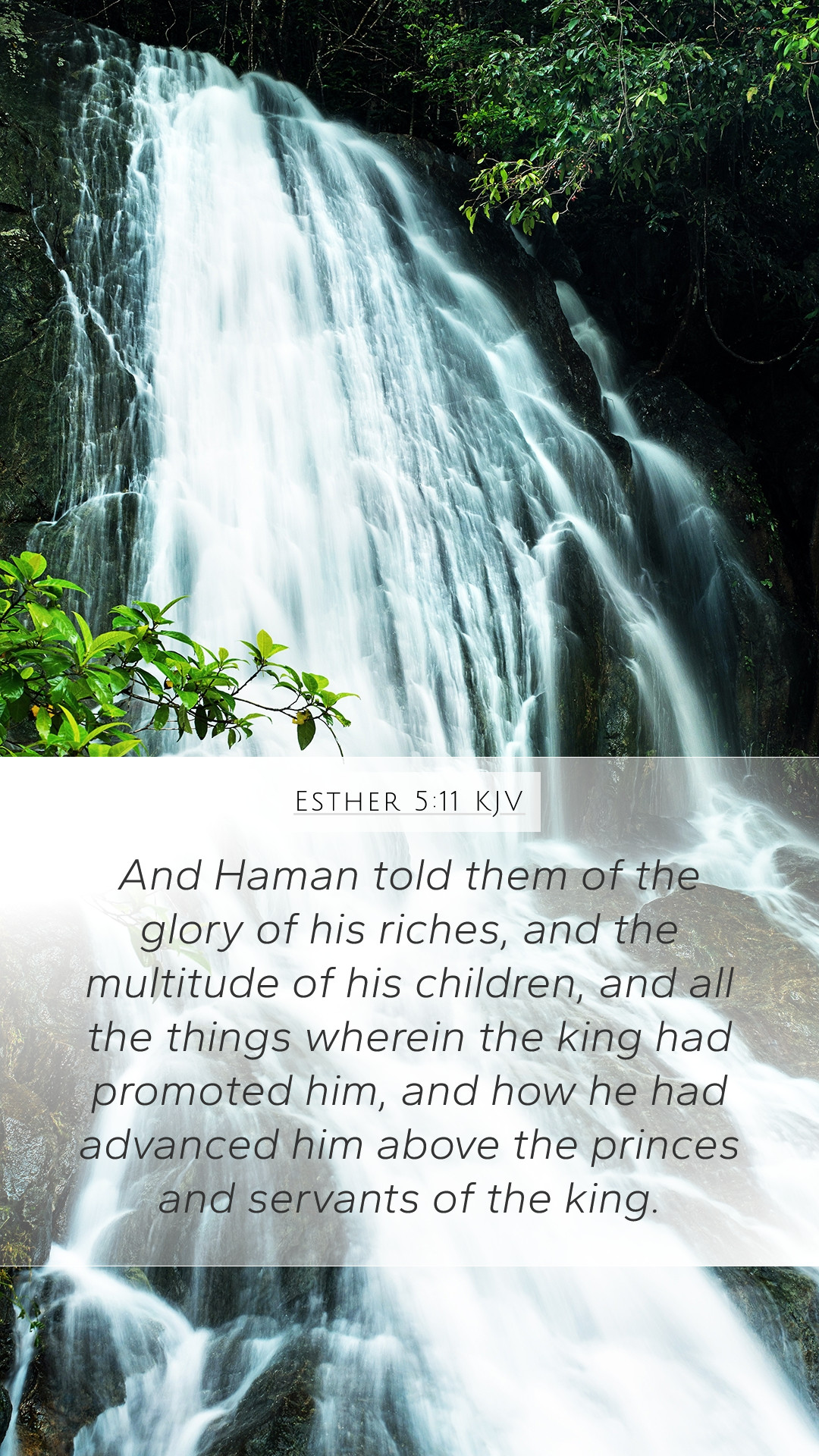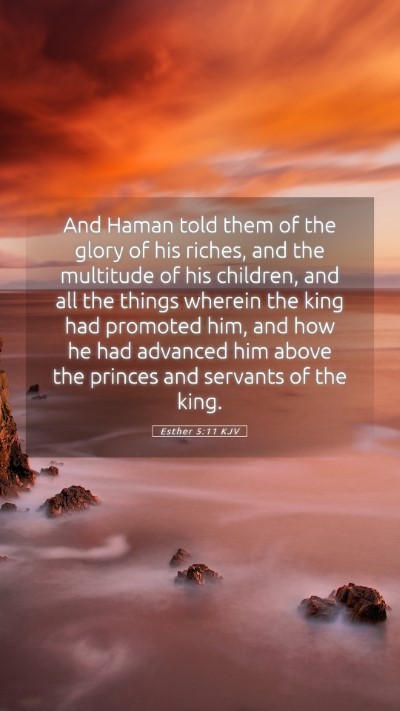Old Testament
Genesis Exodus Leviticus Numbers Deuteronomy Joshua Judges Ruth 1 Samuel 2 Samuel 1 Kings 2 Kings 1 Chronicles 2 Chronicles Ezra Nehemiah Esther Job Psalms Proverbs Ecclesiastes Song of Solomon Isaiah Jeremiah Lamentations Ezekiel Daniel Hosea Joel Amos Obadiah Jonah Micah Nahum Habakkuk Zephaniah Haggai Zechariah MalachiEsther 5:11 Meaning
What is the meaning of Esther 5:11?
And Haman told them of the glory of his riches, and the multitude of his children, and all the things wherein the king had promoted him, and how he had advanced him above the princes and servants of the king.
Esther 5:11 Bible Verse Meaning
Bible Verse Meaning: Esther 5:11
The verse Esther 5:11 recounts the grand display of wealth and honor by Haman before King Ahasuerus, leading us to explore the profound implications behind this moment.
Overview of Esther 5:11
In the context of Esther 5:11, Haman boasts about his royal favor, wealth, and the honors bestowed upon him. This self-aggrandizing behavior is critical in understanding his character and the unfolding drama in the narrative of Esther.
Insights from Public Domain Commentaries
-
Matthew Henry's Commentary:
Henry emphasizes the arrogance of Haman as he seeks to elevate himself through boasting. Haman’s words reflect a deep-seated pride and an eventual downfall, illustrating how unchecked ego can lead to one's ruin.
-
Albert Barnes' Notes:
Barnes notes that Haman’s focus on his own importance serves to highlight the contrast between his material wealth and Esther’s moral integrity. This serves to remind readers of the spiritual emptiness that often accompanies worldly honor.
-
Adam Clarke's Commentary:
Clarke points out that Haman is depicted as fully aware of his exalted position yet still discontented due to Mordecai’s disrespect. This illustrates the relational dynamics at play within the narrative and the eventual consequences of jealousy and pride.
Key Themes in Esther 5:11
- Identity and Recognition: Haman’s attempt to assert his worth through the king’s recognition highlights the theme of identity rooted in external validation.
- Contrast between Pride and Humility: Haman's prideful display juxtaposes the humility displayed by Esther, prompting reflection on the nature of true honor.
- Divine Providence: The buildup of Haman’s pride foreshadows his eventual downfall, illustrating the biblical principle that pride goes before destruction (Proverbs 16:18).
Application of Esther 5:11
Understanding Esther 5:11 involves recognizing its application to daily life. The verse serves as a warning against the pitfalls of pride and the importance of humility, especially in our interactions and relationships.
Related Bible Cross References
- Proverbs 16:18: "Pride goes before destruction, and a haughty spirit before a fall."
- James 4:6: "God resists the proud, but gives grace to the humble."
- Esther 3:1: "After these things King Ahasuerus promoted Haman, the son of Hammedatha the Agagite..."
- Philippians 2:3: "Do nothing from selfish ambition or conceit, but in humility count others more significant than yourselves."
- Luke 14:11: "For everyone who exalts himself will be humbled, and he who humbles himself will be exalted."
Conclusion
Esther 5:11 acts as a profound commentary on the dangers of pride and the importance of humility. The interplay of Haman’s ambition and Esther’s quiet agency serves as a powerful reminder of how God often elevates the humble while humbling the proud.
For those seeking deeper Bible study insights and looking to expand their understanding of Scripture, the interpretation of Esther 5:11 serves as an illuminating example of biblical storytelling and its timeless relevance.


